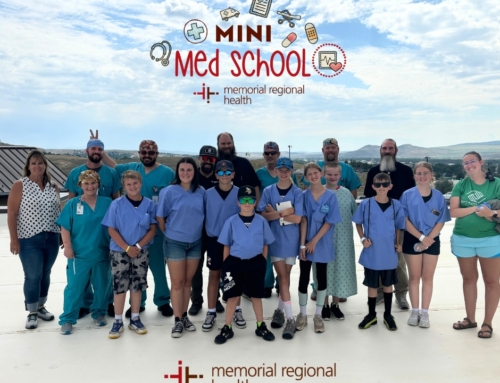If you have heart disease, atrial fibrillation, or A-Fib, a mechanical heart valve or a clotting disorder, your doctor has likely talked with you about taking the drug Coumadin. If you are on Coumadin, you’ll be happy to learn that Memorial Regional Health has created a dedicated Coumadin Clinic to help manage the benefits of Coumadin and avoid the common side effects of this medication.
Coumadin, also called warfarin, is an anti-clotting medication commonly referred to as a blood thinner. Getting the right amount is extremely important for proper care and management. Get too much, and you might bleed; get too little, and it won’t prevent blood clots from forming in your bloodstream, which could lead to stroke or other complications.
Coumadin levels are measured by checking an International Normalized Ratio, or INR, level, which detects the level of clotting in the blood. The INR number indicates if the right dose of Coumadin has been achieved for a patient, which varies in every person. According to recent studies, people who have their medication monitored at an anticoagulation clinic have fewer recurrent blood clots and fewer episodes of major bleeding.
“It’s new for patients to see a pharmacist, but it’s important to take the time to manage Coumadin closely. When it comes to adverse drug events, Coumadin is associated in more than 25 percent of all hospitalizations and 1 in 7 emergency visits. People come in nervous, but I take the time to put them at ease. It’s important to me that they leave feeling reassured,” said Karen Sweeney, PharmD, clinical pharmacist of the MRH Coumadin Clinic.
The advantage of having the anticoagulation or Coumadin Clinic is that Sweeney is available to meet with patients several times at the start to get the dosage just right. She spends an hour during the first visit going over diet, lifestyle other medications and health conditions, because all have an effect on Coumadin. After three to five days, she follows up to monitor the drug.
Every patient and dosage is different, so the number of visits and follow-ups varies, depending on how well the patient responds to Coumadin therapy. Once a dose is established, the patient returns for monthly routine checks.
“Warfarin can be a potent drug, and it needs to be well-managed. A big, tall man might need 1 milligram, while a tiny woman might need 15 milligrams. That’s why I take the time to really talk with people. I allow plenty of time, because I want people to feel relaxed enough so they can express everything to me. When that happens, we get it right,” Sweeney said.
People take Coumadin to prevent harmful blood clots from forming, which can lead to heart attack, stroke, deep vein thrombosis and pulmonary embolism. Besides heart-related diseases, Coumadin is prescribed for hereditary clotting disorders. For example, some people are prone to clots in their legs, which can travel to their lungs.
“Once the dose is stable, it’s a relatively safe drug to use, and studies show that it greatly reduces the risk of stroke,” Sweeney said.
Sandra Kruczek, a Craig resident and current patient of the Coumadin Clinic, couldn’t be more pleased with the care she has received. She was nervous when her provider suggested she start Coumadin, but she feels the extra time Sweeney took to get her dosage right has made all the difference in her feeling better these days.
“I met Karen, and I was stunned. What an education! And what an interesting clinic. I was amazed at the time she took to sit with me and discuss how it works,” Kruczek said.
To learn more about the Coumadin Clinic, call 970-826-3050. As a patient who takes warfarin, your provider may refer you to the Coumadin Clinic, or you can request a referral from your healthcare provider. Clinic hours are 8 a.m. to 5 p.m. Monday through Friday at the Memorial Hospital Campus.





